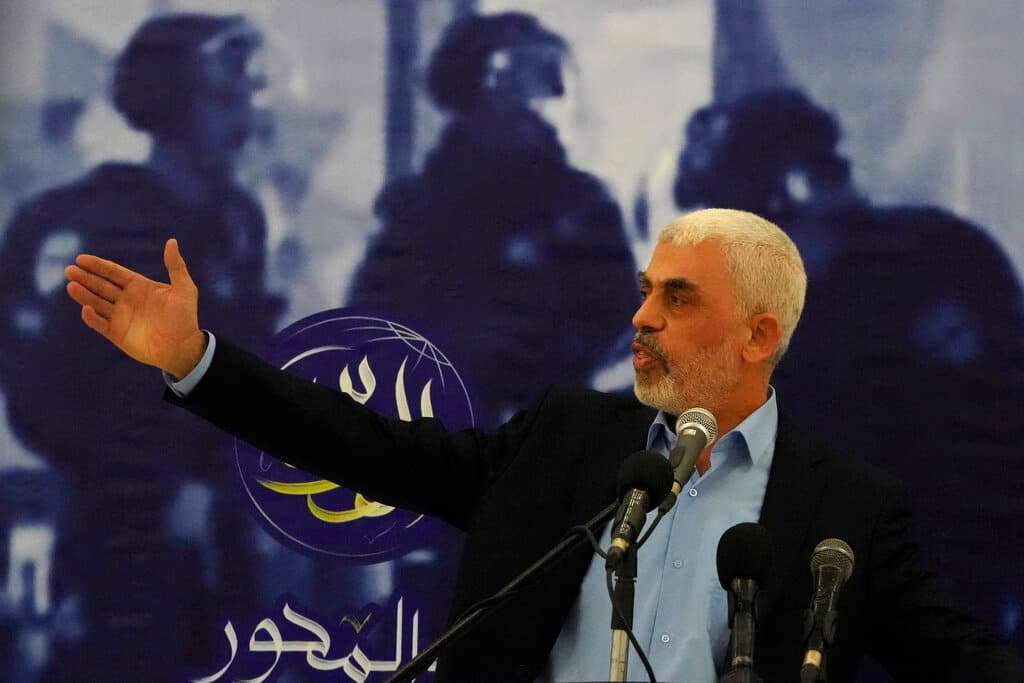Treasury Moves To Cut Off Hamas’s Funding Sources as Terrorist Group Faces Divide Between Gaza and Qatar Factions
The top Hamas commander at Gaza is reportedly enraged to learn of talks with the Palestinian Authority about post-war cooperation.

As signs grow of fissures between the Hamas leadership abroad and its commanders in Gaza, the Treasury Department is attempting to cripple the terror organization’s fund-raising machine.
The Qatar-based Hamas leadership is reportedly eager to start talking about the day after the Gaza war. The political leaders at Doha, including Hamas chief Ismail Hanieyh and his deputy, Khaled Mashal, recently met with envoys of President Abbas of the Palestinian Authority to discuss post-war cooperation.
Reports of the meeting enraged Gaza’s top commander, Yahya Sinwar, according to a veteran military affairs Israeli analyst, Ehud Yaari. On Channel 12 television Mr. Yaari reported, based on unidentified Arab sources, that “when Sinwar heard of these negotiations in his bunker in Gaza, he was enraged and demanded that all post-war talks cease.”
While such specifics are unconfirmed, fissures between Doha and Gaza have long been reported — and ridiculed. “Donate us money, my dog needs a new Armani/ Gaza sky is black, but Qatar is always sunny,” is part of a musical spoof on Israel’s top comedy show, “Eretz Nehederet,” or “It’s a Wonderful Country.”
The English-language sketch features a woman who asks donors to send money for children in Gaza. Rather than helping the Strip, however, donations from across the world end up padding the lavish lifestyles of Hamas’s leadership at Doha. The reported net worth of Messrs. Haniyeh and Mashal, as well as another Hamas big, Mousa Abu Marzuk, are posted alongside a depiction of the luxuries they enjoy in Doha hotels.
Such caricatures may exaggerate the gap between Gaza’s grim realities and the high life of top Hamas leaders. Yet, they reflect the complex problem facing authorities attempting to deny funds to terrorists: where does the money go?
New sanctions on Hamas-linked individuals and organizations in Turkey, Lebanon, and elsewhere were simultaneously announced Wednesday at Washington and London.
“That is good, and let’s hope European countries join too,” the director at Reichman University’s counterterrorism institute, Miri Eisin, tells the Sun. Yet, she adds, imposing sanctions on organizations like Hamas is an endless uphill battle. “Everyone agrees that you need to cut funds for terrorists. The challenge is to close loopholes that always open up,” she says.
“Hamas is a hybrid terror organization,” Ms. Eisin, a former colonel in Israel Defense Force intelligence, says. “There is a governance wing, a military wing, and a charity wing. Good people donate to charity but their money ends up financing terrorism. An even more complex task is how to prevent funds held in banks abroad from reaching Gaza and the West Bank.”
One of the individuals designated by the treasury department Wednesday is Haroun Nasser al-Din, who was “involved in a network that transferred funds from Türkiye and Gaza to the Hamas command center in Hebron, West Bank, and worked with U.S.-designated Hamas senior official Salih Al-Aruri to provide financial support to Hamas activities to further unrest in the West Bank,” according to the Treasury department release.
Hamas’s top envoy in Turkey, Jihad Yaghmour, was also included in the new sanctions list, as was a Turkey-based operative, Mehmet Kaya, who “has been involved in multiple money transfers on behalf of Hamas over several years, ultimately providing tens of millions of dollars of financial services for Hamas.”
Turkey is increasingly emerging as one of Hamas’s top supporters in the region, alongside Qatar, Lebanon, and Algeria. A NATO member, Ankara nevertheless is turning sharply on America and Israel. Mr. al-Aruri, a top Hamas official and financier who has long lived at Istanbul and recently moved to Lebanon, has now returned to Turkey, according to Israel’s public broadcaster Kan.
The chief of Shabak, Israel’s internal intelligence unit, Ronen Bar, has vowed to hunt Hamas leaders “in Gaza, in the West Bank, in Lebanon, in Turkey, in Qatar, everywhere.” For hunted Hamas leaders Istanbul may seem more secure currently than Beirut. At the same time, an American designation of Hamas’s money managers could complicate Ankara’s relations with Washington.
Targeting designated terrorist financiers entails freezing their banks’ access to dollar-based transactions. As the greenback is the leading global currency, allowing terrorists to maintain accounts could doom a banking institution. As Washington targets terror financing, President Erdogan’s Islamist ideology may result in weakening Turkish banks, which could further hurt the already ailing economy.
Jerusalem officials say the war may last months. Efforts to interrupt Hamas’s complex fund-raising could help speed up Israel’s mission: eliminating the group that on October 7 committed one of the most atrocious terrorist acts in history.

